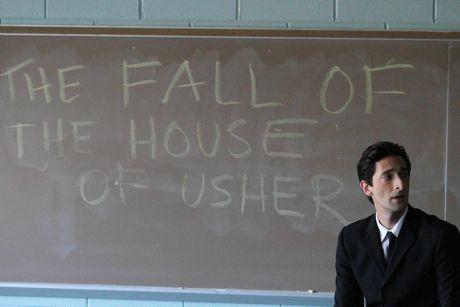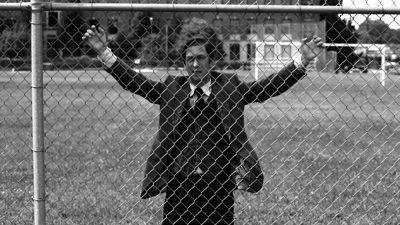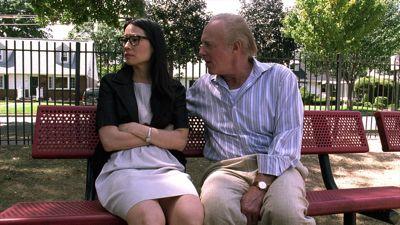Q&A with Tony Kaye at D&AD
Tony Kaye Hunger Magazine
Best of Tribeca: The Heartbreaking Rise of the House of Kaye, Scallywag and Vagabond, Apr ‘11
Interview with Lake of Fire Filmmaker Tony Kaye, About.com Sept ‘07
‘I did abominable things’ The Telegraph, Jun ‘07
A quck chat with Tony Kaye, kamera.co.uk Sept ‘98
Too big for his ads? Profile: The Independant, 1996Share:
![]()






29 Apr 2011

A slick and shiny, dark-knighted version of his eminently human chameleon star, Oscar-winner Adrien Brody holds the mike for him as he serenades the crowd rock-and-roll style. Something about art and life and tribulations, and about not caring. Ever the orchestrator, he aptly gets the glitzy sold-out theater to belt out: “I don’t care!” in unison before the lights go down. Aptly, because ready or not we will have to care, and aptly, because our serially-failing efforts to erect a barricade around our tender-hearted feelings are at the very core of Detachment.
Yes, darkness has its twists and meandering turns and it’s likely Tony rode a few of those in the years since hijacking the self-respecting middle-class with American History X (Open wide, anyone?). He came back with a bag full of punches and a heart full of compassion. Detachment is anything but, a throbbing wound of love and suffering relentlessly pounding in all of our chests. And yet, mischief often undermines misery, empathy always overwhelms detachment, artistry never overshadows storytelling.
Brody’s Henry is a substitute teacher coming to wave a bit of literature in front of terminally unruly students, to catch who will listen and stay out of trouble. Henry is a substitute teacher visiting one of those tough high schools for a few weeks, to bear witness to the shattered souls attempting to keep the altruistic dream alive and to the lost ones that demolish it daily. Henry doesn’t mind being a substitute teacher, he likes floating in and out of drama and keeping his heart intact. Henry’s actually fine acting as a temporary substitute for a human being because then life can be lived without consequences, in tightly-wound single-serving packets, his reality changing at regular three-week intervals. Things don’t have a lasting effect on him and he doesn’t have a lasting effect on anything or anyone. That’s the plan. Trying really hard not to care.
Henry’s plan unravels hard in the course of those few weeks. Perhaps the only reason Henry had opted for detachment to begin with was because he is anything but: he is a breathing, walking, feeling machine. Perhaps the very many visages he has seen desolation wear made him more acutely aware of the universality of human suffering. Perhaps his secret is tucked away in the murky folds of an untold family history. Or perhaps he was just born this way, like the rest of us. But his curse and ours is in having to feel and experience every last drop of human frailty down to the very bone. Each breath a kaleidoscope of pain, ricocheting on an ever growing cast of characters. Henry, Brody and Tony know pain is our brotherhood, they know to ignore the particulars of every situation as, from the inside, it is all the same: broken, hurt and angry souls, crushed by the pressure, barely reaching out for air from under “an ocean of pain.”
But don’t go assuming Detachment is a sort of bleeding melodrama holding a loaded gun to your heart. Profoundly cinematic, the film rides half-a-dozen different waves and never gets submerged. A truly phenomenal cast paints often extreme characters making a point to jar our expectations, but never veering far off the experiential ground we share. Caught in the political loopholes of a sacrificed educational system, Marcia Gay Harden, as hard-as-nails Principal Dearden, whispers in the PA system microphone curled up on her office carpet. James Caan, in a milestone performance, kicks the teens’ gangsta rhetoric far into next week (it could be said of James Caan’s career that it resembled a solid battalion of very impressive B1 Bombers. Here, in a handful of collectible scenes, he takes off like a rocket and leaves us on the launching pad, stunned). Lucy Liu is almost unrecognizable as a bruised, nervously spent guidance counselor. Christina Hendricks lends her fragile yet determined countenance to a most self-righteous and idealistic history teacher.
But at the heart of Henry’s re-sensitization journey are the semi-precious weapons of newcomers Betty Kaye and Sami Gayle, painting the two memorable sides of despaired teenage girlhood’s delicate coin. Erica is the hardened, street-wise, carefree girl-toy that buries her loneliness in haphazard prostitution. Meredith is the wounded, introverted and luminary artist trapped inside the form that will attract the world’s worst cruelties. Together they tug at Henry’s heartstrings in the sometimes cunning, sometimes drastic ways that abandoned youth will swallow its pride to finally demand care. Through them, he will learn to shed the cynical presumption that human suffering at large can’t be helped. And once the armor thins and finally shatters, he will rise to honor his own personal powers. You can do what you can to ease the pain, one human being at a time. And maybe you must, as there might be no other way to make it out of this world in one piece.

This is how Detachment rises so far above the grim realities it endeavors to portray. If it throws some solid punches to disturb our own detachment, it does so with such acute compassion and cinematic elegance that consistently, it leaves us a flush with wonder at the sheer beauty of this finely wrought machinery we call human beings.
How delicately intricate we are, how incredibly perceptive, how creative in the ways we find to rewrite our own odysseys on an hourly basis… Henry takes us for a ride inside his own supposedly numbed heart and we can’t help but reverberate with, yes, love, with each tremulous beat. In the expressionistic flashbacks (red! red! listen for it!), in the devilish blackboard animations, in the Hopper-esque portraits (red!), in the eloquence of jump- and cross-cuts, Henry’s perception is everywhere. Frantic, or spent, injected with adrenalin, lightness or loss, the film’s original rhythms and vivid imagery remind us of what it’s like to feel our way into the world – what does it feel like to be alive? It feels like this. It’s absurd and complex and crazy and funny and sad, and it makes no sense, and why does the blinking eye of the answering machine break my heart? (It is red, red, red…) Why do broken chairs with dirty papers flying through them make me want to leap with joy? This is where true artistry in filmmaking makes the most of its abundant tools and disappears into the complexities of life itself.

Novelist Vivian Walsh says “hurt people hurt people.” And he’s right, of course. Now Henry might have been an existentialist to begin with, but for all his reluctance, he finally shows us the way we might have to go if we are to evolve past the self-annihilating impasse revenge and selfishness are painting us into the world over. Hurt people help people instead. Oh, I know how you hate to hear this, forgiveness, compassion and worst of all: effort. Take a little extra step beyond the self-cloying depression you call comfort and do something you’d rather dismiss.
All in all, it’s fairly safe to say that Mr. Tony Kaye, complete with blood-stained cardboard, acoustic guitar and Whole Foods recyclables, has done it again.
If I am to believe the muttering crowd that seeped out of the theater Monday night, Detachment has renewed some of our faith in the purpose of such things as film festivals and is soon to join the ranks of American History X in the pantheon of the most potent, lasting and thought-provoking films of our time. Yes. And you better wash that silly post-modernistic smirk off your face or, to quote James Caan’s Mr. Seaboldt, “I’m gonna armfuck your shit up tight. Motherfucker.”
By Verane Pick Read the original article
Total: 2
Excellent content. I have been long time fan of human chameleon star Adrien Brody. He is the great star and Oscar Winner. He is my hero. cash and carry Thanks!
By Emma Oakson on 15:04, 30 Jan 2012
Haha.... Very interesting content. Here the best of Tribeca whatever you wrote seems to me excellent exposed. Webdesign Thanks!
By Maxin Pollerd on 12:12, 31 Jan 2012